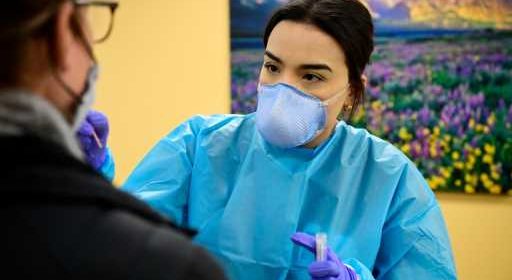Colorado’s COVID cases still high, but not unprecedented

Colorado’s COVID-19 numbers are no longer unprecedented, but they’re still high enough that it’s wise to keep masks handy for a while, a member of the state’s modeling team said Monday.
The state reported 21,268 new cases in the week ending Sunday — near the high point of the fall 2021 surge driven by the virus’s delta variant. At the worst point of the current omicron-fueled wave, in early January, the Colorado Department of Public Health and Environment reported more than 90,000 cases in a single week.
COVID-19 deaths continued to increase, however, approaching levels seen at the peak of the delta wave in November. So far, the state has reported 258 deaths from COVID-19 in the third week of January, and that number could increase as late reports come in.
The percentage of tests coming back positive also returned to the precedented zone, averaging 12% over the last week — the lowest rate since Christmas. That’s still higher than the state’s goal of 5%, but indicates the public health system has a better picture of how many people are infected than it did in recent weeks.
Hospital admissions were at roughly the level seen at the trough between the delta and omicron waves, with 979 people hospitalized statewide with confirmed COVID-19. That’s still well above previous lows, however. During summer 2021, between 250 and 300 people were hospitalized with COVID-19 any given day.
It’s unlikely that hospital capacity will be in jeopardy again any time soon, said Beth Carlton, an associate professor of environmental and occupational health at the Colorado School of Public Health. But getting rid of masks is premature when the virus is this widespread, she said.
“Things are much better, but we still are at high levels,” she said.
When Denver, Adams and Arapahoe counties announced they were lifting their mandates, their public health directors noted omicron was running out of potential hosts. But “running out” is not the same as “has run out,” and many kids remain unvaccinated, Carlton said.
“I think that at some point it will be appropriate to have this conversation” about no longer requiring masks in schools, she said. “If you get rid of masks when transmission is high, it will facilitate spread to those remaining susceptible people.”
So far, it appears unlikely that the latest variant, known as BA.2, would cause another surge, Carlton said. BA.2 is somewhat more contagious than omicron (also known as BA.1), but it doesn’t seem to be any better at infecting people who recently recovered from the virus or who were vaccinated.
That means BA.2 could be better able to reach the remaining susceptible people than omicron, but given that the pool of potential hosts is shrinking, the damage it could cause would likely be limited, Carlton said. It could, however, lengthen the time it takes for the current wave to bottom out, she said.
“If they both have the same immunity profile and one is more infectious — provided it gets here in time — it should outcompete” omicron, she said.
Source: Read Full Article